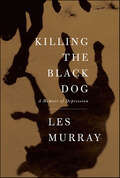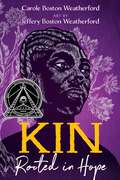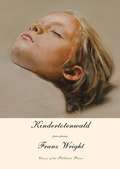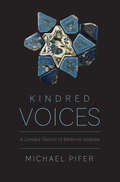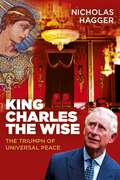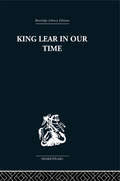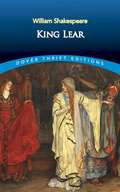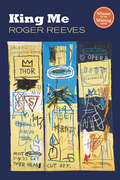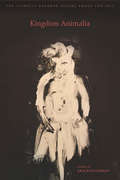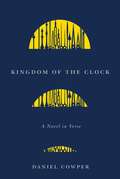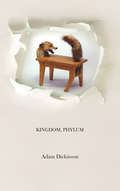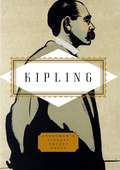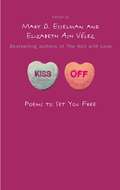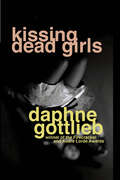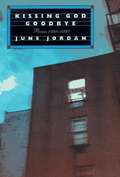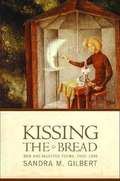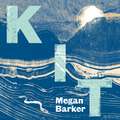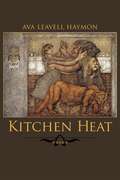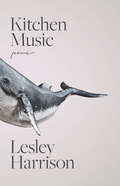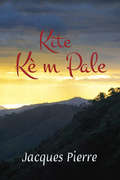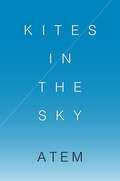- Table View
- List View
Killing the Black Dog: A Memoir of Depression
by Les MurrayIn 1988, shortly after moving from Sydney back to his birthplace in the rural New South Wales hamlet of Bunyah, Les Murray was struck with depression. In the months that followed, the "Black Dog" (as he calls it) ruled his life. He raged at his wife and children. He ducked a parking ticket on grounds of insanity, and begged a police officer to shoot him rather than arrest him. For days on end he lay in despair, a state in which, as he puts it precisely, "you feel beneath help." Killing the Black Dog is Murray's recollection of those awful days: brief, pointed, wise, and full of beauty in the way of his poetry. The prose text—delicately balanced between personal and informative—gives a glimpse of the imprint that depression can leave on a life. The accompanying poems show their roots in his crisis—a crisis from which, he reports toward the close of this poignant book, he has fully recovered. "My thinking is no longer jammed and sooty with resentment," he recalls. "I no longer wear only stretch-knit clothes and drawstring pants. I no longer come down with bouts of weeping or reasonless exhaustion. And I no longer seek rejection in a belief that only bitterly conceded praise is reliable." Killing the Black Dog is a crucial chapter in the life of an outstanding poet.
Kin: Rooted in Hope
by Carole Boston WeatherfordA Coretta Scott King Honor Book An &“imaginative and moving&” (The Horn Book, starred review) portrait of a Black family tree shaped by enslavement and freedom, rendered in searing poems by acclaimed author Carole Boston Weatherford and stunning art by her son Jeffery Boston Weatherford.I call their names: Abram Alice Amey Arianna Antiqua I call their names: Isaac Jake James Jenny Jim Every last one, property of the Lloyds, the state&’s preeminent enslavers. Every last one, with a mind of their own and a story that ain&’t yet been told. Till now. Carole and Jeffery Boston Weatherford&’s ancestors are among the founders of Maryland. Their family history there extends more than three hundred years, but as with the genealogical searches of many African Americans with roots in slavery, their family tree can only be traced back five generations before going dark. And so from scraps of history, Carole and Jeffery have conjured the voices of their kin, creating an often painful but ultimately empowering story of who their people were in a breathtaking book that is at once deeply personal yet all too universal. Carole&’s poems capture voices ranging from her ancestors to Frederick Douglass to Harriet Tubman to the plantation house and land itself that connects them all, and Jeffery&’s evocative illustrations help carry the story from the first mention of a forebear listed as property in a 1781 ledger to he and his mother&’s homegoing trip to Africa in 2016. Shaped by loss, erasure, and ultimate reclamation, this is the story of not only Carole and Jeffery&’s family, but of countless other Black families in America.
Kindergarten Kids: Riddles, Rebuses, Wiggles, Giggles, And More! (Into Reading, Read Aloud #Module 1, Book 3)
by Stephanie Calmenson Melissa SweetNIMAC-sourced textbook
Kindertotenwald
by Franz WrightA genre-bending collection of prose poems from Pulitzer Prize-winner Franz Wright brings us surreal tales of childhood, adolescence, and adult awareness, moving from the gorgeous to the shocking to a sense of peace. Wright's most intimate thoughts and images appear before us in dramatic and spectral short narratives: mesmerizing poems whose colloquial sound and rhythms announce a new path for this luminous and masterful poet. In these journeys, we hear the constant murmured "yes" of creation--"it will be packing its small suitcase soon; it will leave the keys dangling from the lock and set out at last," Wright tells us. He introduces us to the powerful presences in his world (the haiku master Basho, Nietzsche, St. Teresa of Avila, and especially his father, James Wright) as he explores the continually unfolding loss of childhood and the mixed blessings that follow it. Taken together, the pieces deliver the diary of a poet--"a fairly good egg in hot water," as he describes himself--who seeks to narrate his way through the dark wood of his title, following the crumbs of language. "Take everything," Wright suggests, "you can have it all back, but leave for a little the words, of all you gave the most mysteriously lasting." With a strong presence of the dramatic in every line, Kindertotenwald pulls us deep into this journey, where we too are lost and then found again with him.From the Hardcover edition.
Kindred Voices: A Literary History of Medieval Anatolia
by Michael PiferThe fascinating story of how premodern Anatolia&’s multireligious intersection of cultures shaped its literary languages and poetic masterpieces By the mid-thirteenth century, Anatolia had become a place of stunning cultural diversity. Kindred Voices explores how the region&’s Muslim and Christian poets grappled with the multilingual and multireligious worlds they inhabited, attempting to impart resonant forms of instruction to their intermingled communities. This convergence produced fresh poetic styles and sensibilities, native to no single people or language, that enabled the period&’s literature to reach new and wider audiences. This is the first book to study the era&’s major Persian, Armenian, and Turkish poets, from roughly 1250 to 1340, against the canvas of this broader literary ecosystem.
King Charles the Wise: The Triumph of Universal Peace
by Nicholas HaggerIn King Charles the Wise, Nicholas Hagger celebrates the UK&’s post-Brexit global destiny and foresees the birth of a united world. Following the tradition of Ben Jonson&’s 17th-century celebratory court masques in verse and his own The Dream of Europa (which celebrated 70 years of peace in Europe), and incorporating the blend of mythology and history and five sections (prologue, antimasque, masque, revels and epilogue) found in all masques, he describes how Zeus sends Minerva, goddess of Wisdom, as an ambassador to Prince Charles in Buckingham Palace. Zeus wants a democratic World State to end all wars, as called for by Truman, Einstein, Churchill, Eisenhower, Gandhi, Russell, J.F. Kennedy and Gorbachev. He sees the innovative and influential UK as best placed to give this humanitarian vision global prominence, and seeks the support of its future King, Charles, deeming him more enduring and open-minded than its transient, partisan politicians. Minerva confronts Prince Charles with the conflicting perspectives of the goddesses Britannia, Europa and Columbia (who speak for the UK, EU and US), and foresees a World State that will abolish war. He accepts the humanitarian concerns behind this Universalist vision, and Minerva crowns him &‘King Charles the Wise&’. Besides being King of the UK and all its faiths he will sympathise with the plight of all humankind and inspire a new world structure that can bring universal peace during the coming Carolingian Age.
King Lear in our Time
by Maynard MackThis edition first published in 1966. Previous edition published 1965 by the University of California Press. Perhaps more than any other play of Shakespeare's King Lear has been subjected to almost totally contradictory interpretations. In the first historical section of the book the author describes the varying concepts of the play and the distortions of text and even plot that have been widely used. Garrick's playing of Lear as a pathetic and down-trodden old man. Laughton's and Olivier's versions and Herbert Blaus's theory of the 'subtext' are described and analysed. The central section of the book examines the medieval, folk and romance sources of the play. The final chapter illustrates how the action of the play and its pervading violence and evil are not explained in terms of human motive and rely for their meaning more on their effects than their antecedents. An important theme is the play's examination of society and the ties of service and family love.
King Lear: Large Print (Dover Thrift Editions)
by William ShakespeareFirst performed about 1805, King Lear is one of the most relentlessly bleak of Shakespeare's tragedies. Probably written between Othello and Macbeth, when the playwright was at the peak of his tragic power, Lear's themes of filial ingratitude, injustice, and the meaninglessness of life in a seemingly indifferent universe are explored with unsurpassed power and depth.The plot concerns a monarch betrayed by his daughters, robbed of his kingdom, descending into madness. Greed, treachery, and cruelty are rife and the denouement of the play is both brutal and heartbreaking. In fact, so troubling is its vision of man's life that, until the mid-19th century, the play was performed most often with a non-Shakespearean happy ending, with Lear back on his throne and Cordelia, the daughter nearest his heart, happily married to the noble Edgar. But there is a dark magnificence to Shakespeare's original vision of the Lear story, and the play is performed today essentially as he wrote it, uncompromised by later "improvements." King Lear is reprinted here from an authoritative British edition, complete with explanatory footnotes.
King Me
by Roger ReevesOn the "Best Poetry Books of the Year" list from Library Journal "A sophisticated and breathtaking writer, Reeves takes the reader on a harrowing journey: each poem comes packed with arresting imagery, relentless in its examination of how tragedy and trauma become internalized - cleaning out the wounds to understand the pain."-Los Angeles Review of Books"Roger Reeves' King Me stitches together many worlds into one startling and visceral book. His ranging, encyclopedic knowledge crosses history, medicine, biology, metapoetics and more, but he tackles it all with a bold and sonorous surrealist flow."-American Microreviews From a horse witnessing the lynching of Emmett Till to Mikhail Bulgakov chronicling the forced famines in Poland in the 1930s, King Me examines the erotics of care and the place of song, elegy, and praise as testaments to those moments. As Roger Reeves said in an interview, "While writing King Me, I became very interested in the mythology of king, the one who is sacrificed at the end of the harvest season. . . . For me, the myth manifests in the killing of young black men, Emmett Till, and in the ways America deems young, black male bodies as expendable-Jean Michel Basquiat, Mike Tyson, Jack Johnson. These are the young kings whom we love to kill-over and over again."From "Some Young Kings":The hummingbirds inside my chest,with their needle-nosed pliers for tonguesand hammer-heavy wings, have left a messof ticks in my lungs and a punctured lullabyin my throat. Little boy blue come blowyour horn. The cow's in the meadow. And Dorothy's alone in the corn with Jack, his black fingers, the brass of his lips, the half-moons of his fingernails clickingalong her legs until she howls-Charlie Parker. Charlie Parker. Charlie Parker . . . Roger Reeves earned his MFA from the James A. Michener Center for Creative Writing and his PhD from the University of Texas. His poems have appeared in Poetry, American Poetry Review, and Boston Review. He teaches at the University of Illinois, Chicago.
Kingdom Animalia
by Aracelis GirmayThe poems in this highly anticipated second book are elegiac poems, as concerned with honoring our dead as they are with praising the living. Through Aracelis Girmay's lens, everything is animal: the sea, a jukebox, the desert. In these poems, everything possesses a system of desire, hunger, a set of teeth, and language. These are poems about what is both difficult and beautiful about our time here on earth. Aracelis Girmay's debut collection won the Great Lakes Colleges Association New Writers Award. A Cave Canem Fellow, she is on the faculty at Drew University and Hampshire College. She lives in Brooklyn, New York.
Kingdom Animalia (American Poets Continuum #131)
by Aracelis GirmayThe poems in this highly anticipated second book are elegiac poems, as concerned with honoring our dead as they are with praising the living. Through Aracelis Girmay's lens, everything is animal: the sea, a jukebox, the desert. In these poems, everything possesses a system of desire, hunger, a set of teeth, and language. These are poems about what is both difficult and beautiful about our time here on earth. Aracelis Girmay's debut collection won the Great Lakes Colleges Association New Writers Award. A Cave Canem Fellow, she is on the faculty at Drew University and Hampshire College. She lives in Brooklyn, New York.
Kingdom of the Clock: A Novel in Verse (Hugh MacLennan Poetry Series)
by Daniel CowperSuch exchanges animate the kingdom // of the clock, but one by one their trades / complete, blink out like eyes. The city sleeps.Set in a vibrant yet ragged coastal city, Kingdom of the Clock is a verse novel whose interwoven storylines begin with one day’s dawn and end at the first light of the next. Within the cycles of that single day, the lives of the city’s inhabitants unfold.An aging stock promoter presides over the fruits of his predatory life. A woman tracks her husband’s iPhone to the casino. An artist races to prevent her masterpiece from being seized to cover unpaid rent. A commuter is shaken by a private vision. A mother plots to care for her unwell adult daughter. Senior and junior partners involved in a fraud weigh the risks and rewards of betraying each other. A boy boards an oil tanker with his father in an emergency. An elderly chess player prays to the moon for his grandchild to be born alive. A homeless man does not know his father is dying.After night’s crescendo comes the blank page of a new day. A clear, flowing lyricism fuses the many moving parts of Kingdom of the Clock into an immersive, unforgettable reading experience.
Kingdom, Phylum
by Adam DickinsonShortlisted for the 2007 Trillium Book Award for Poetry Ecologically aware poems, hardwired to the intellect and the heart in equal measure. Adam Dickinson's poems, with firm intellectual bite and imaginative scope, reach fresh levels of poetic -- and ecological -- awareness. Sometimes reminiscent of Wallace Stevens, sometimes of Christopher Dewdney, and with the ghost of Foucault always in attendance, they ply a language that is cool and precise on the surface to open into the deep resonance of geologic time. Imaginative and contemplative, this writing is bound to refresh the vision of the most world-weary reader. The poems in Kingdom, Phylum push the boundaries of thought and language. Bringing lyrical and unsystematic modes of understanding into play, and keeping his ear tuned to the many disruptions involved in taxonomical arrangement, Dickinson shows how poetry both participates in, and unsettles, the provisional orders which develop between word and world.
Kipling: Poems (Everyman's Library Pocket Poets Series)
by Rudyard Kipling Peter WashingtonBeloved for his fanciful and engrossing children's literature, controversial for his enthusiasm for British imperialism, Rudyard Kipling remains one of the most widely read writers of Victorian and modern English literature. In addition to writing more than two dozen works of fiction, including Kim and The Jungle Book, Kipling was a prolific poet, composing verse in every classical form from the epigram to the ode. Kipling's most distinctive gift was for ballads and narrative poems in which he drew vivid characters in universal situations, articulating profound truths in plain language. Yet he was also a subtle, affecting anatomist of the human heart, and his deep feeling for the natural world was exquisitely expressed in his verse. He was shattered by World War I, in which he lost his only son, and his work darkened in later years but never lost its extraordinary vitality. All of these aspects of Kipling's poetry are represented in this selection, which ranges from such well-known compositions as "Mandalay" and "If" to the less-familiar, emotionally powerful, and personal epigrams he wrote in response to the war.From the Hardcover edition.
Kiss Off: Poems to Set You Free
by Mary D. Esselman Elizabeth Ash Vélez Bestselling authors of The Hell With LoveThe editors of "The Hell with Love" are back, applying their irreverent view of life and love to help melt the hardest heart. For anyone who's been let down by life and love, these poems reveal that the most important person one can fall in love with is oneself.
Kissing Dead Girls
by Daphne GottliebFusing pornography and postfeminist theory, transcript and tell-all, these playful, penetrating poems and stories reach off the page in search of what it is to be known, both to the masses and to the "Other."Gertrude Stein's work is co-opted and re-seen in an attempt to unpack the relationship between love and war; Walt Whitman makes a command performance in dismembered bits of forced formal verse; and The Exorcist and The Devil in Miss Jones are sutured together in an attempt to locate the horror of desire.
Kissing God Goodbye: Poems 1991-1997
by June JordanWith the same pithy but eloquent observations characteristic of Jordan's classic poetry collections,Things that I Do in the Dark and Living Room,and her notable essay collections,Civil WarsandTechnical Difficulties, Kissing God Goodbyewill strike a universal chord as it witnesses the pain, confusion, and passion of what it's like to live in our society at the twilight of the twentieth century. June Jordan's many selves, as poet, essayist, feminist, and activist come together here in a collection of poetry that is alternately lyrical, magical, shockingly spare, pungently political, yet universally resonate. Beautiful love poems are interspersed with poems about Bosnia, Africa, urban America, Clarence Thomas, affirmative action, her mother's suicide, and Jordan's bout with breast cancer. This collection of poetry will be warmly welcomed by June Jordan loyalists and new readers who will thrill to discover a voice that has been described as one of the "most gifted poets of the late twentieth century. "
Kissing the Bread
by Sandra M. Gilbert"[Her] poems startle on every page: at times they bring your heart to your throat."-Peter Dale Scott
Kit
by Megan BarkerMegan and Kit met in their early twenties. Their friendship was intense, wild and true.Years later, when Kit becomes desperately unwell, Megan tries to pull her old friend back from the precipice, navigating the difficulties of revisiting a relationship conceived in the great freedom of youth, whilst attempting to remain fully present in the messy beauty of her family life.Kit is a story of the sumptuous complication - and precariousness - of life and relationships. It describes a call to intimacy in a state of emergency. It is a story of one life disrupted as another moves toward its end.Told in a spare, winding prose-poem, with a voice reminiscent of Max Porter, Elizabeth Smart, Kae Tempest and Rebecca Watson, Kit is a splintered, powerful work of empathy, friendship and unconditional love.
Kitchen Heat: Poems
by Ava Leavell HaymonKitchen Heat records in woman's language the charm and bite of domestic life. Ava Leavell Haymon's poems form a collection of Household Tales, unswerving and unsentimental, serving up the strenuous intimacies, children, meals, pets, roused memories, outrages, and solaces of marriage and family. Some of the poems are comic, such as "Conjugal Love Poem," about a wife who resists giving her husband the pity he seeks when complaining about a cold. Others find myth and fairy tale lived out in contemporary setting, with ironic result. Others rename the cast of characters: husband and wife become rhinoceros and ox; a carpool driver, the ominous figure Denmother.An elderly female is Old Grandmother, who creates time and granddaughters from oyster stew. The humidity of Deep South summers and steam from Louisiana recipes contribute to a simmering language, out of which people and images emerge and into which they dissolve again.Denmother went to college in the 60s,could pin your ears back at a cocktail party.Her laugh had an edge to it,and her yard was always cut.She grew twisted herbs in the flower beds,hid them like weeks among dumpy marigolds.The wolfsbane killed the pansiesbefore they bloomed much.She'd look at you real straight and talkabout nuclear power plants or abortion. At homealone she boiled red potatoes all nightto make the primitive starch that holds up the clouds. -- "Denmother's Conversation"
Kitchen Music
by Lesley HarrisonA cosmology of place written in the songs of whales and birds, folk tales, city streets, and the green glass sea In her first book-length collection of poems to appear in the US, Lesley Harrison looks North to the sea, with the heat of the land at her back, to bring us meditations on whale hunts and lost children, Manhattan sky towers, and the sound of the gamelan in the Gulf of Bothnia. A poetry of spareness in multilayered depths, of textural silence and aural place, Kitchen Music plunges deep through the strata of language where “weather is body” and an Iceland poppy is “as delicate as birch.” In poems and sequences of poems, Harrison spins folktales into threads of family and gender, engages with the work of the artists Roni Horn and Marina Rees, transcribes John Cage and Johannes Kepler into song and litany, pens a hymnal of bees, and turns to storms, glaciers, and the lapwing life in a field of young barley. As the novelist Kirsty Gunn writes in the foreword, Harrison has “taken up the old white whale of the fixed and masculine narratives and made of its seas and weathers her own Moby Dick, a female poetry ‘in praises / repeated, repeating.’”
Kite Kè m Pale
by Jacques PierreIn his latest collection of poetry, Kite Kè m pale (Let My Heart Speak), Jacques speaks lovingly and eloquently about those, including women, who have faced and continue to face difficulties and injustice. His poetry sometimes resorts to uncommon forms of Kreyòl such as jagon and bolit to better expressed that which cannot conveyed commonly, and expose everyone to the linguistic wealth of the country.
Kite Kè m Pale
by Jacques PierreJacques Pierre louvri kè l de batan nan Kite kè m pale pou l envite nou viv kouman entimite ak pwoblèm sosyal pran randevou nan menm kalfou. Powèt la fotografye difikilte ak kouran santiman ki travèse lavi medam yo. Epi, li wete chapo li byen ba pou li salye kouraj Martin Luther King Jr, Malcolm X, ak lòt lidè ki pa te pè batay pou yon minorite ki pran nan cho, e yo mete nan kacho souvan poutèt po yo. Pou fini, li envite nou viv de twa powèm nan langaj jagon ak bolit, epi yon katafal lòt ki fè yonn ak pafen lawouze nou jwenn nan bèl lang nou an.Rekèy powèm sa a se yon envitasyon otè a fè nou tout pou nou dekouvri bèlte lang nou an. Nan chak grenn mo, otè a plonje kè nou nan lanmè Karayib la, kote vag yo fè nanm nou tonbe nan yon ale vini jouk kouran lanmou an rale nou pou nou fè yonn ak powèm yo. -Wedsly Turenne GuerrierLang nou ak kilti nou se rezilta kreyativite nou ki pran nanm nan lavi chak kretyen vivan. Se sa potorik otè Jacques Pierre fè nan rekèy sa a. Pierre marinen lang nou ak kilti nou ansanm pou ofri nou yon konsonmen kreyativite ki se temwayaj richès kiltirèl ak lengwistik Ayiti cheri nou an. -Marky Jean-Pierre
Kites in the Sky
by AtemKites in the Sky distills the wisdom of one lifetime, asking questions, pondering possibilities and embracing simplicity. These humble thought-children, born from love and based on haiku, will give rest to your heart.
